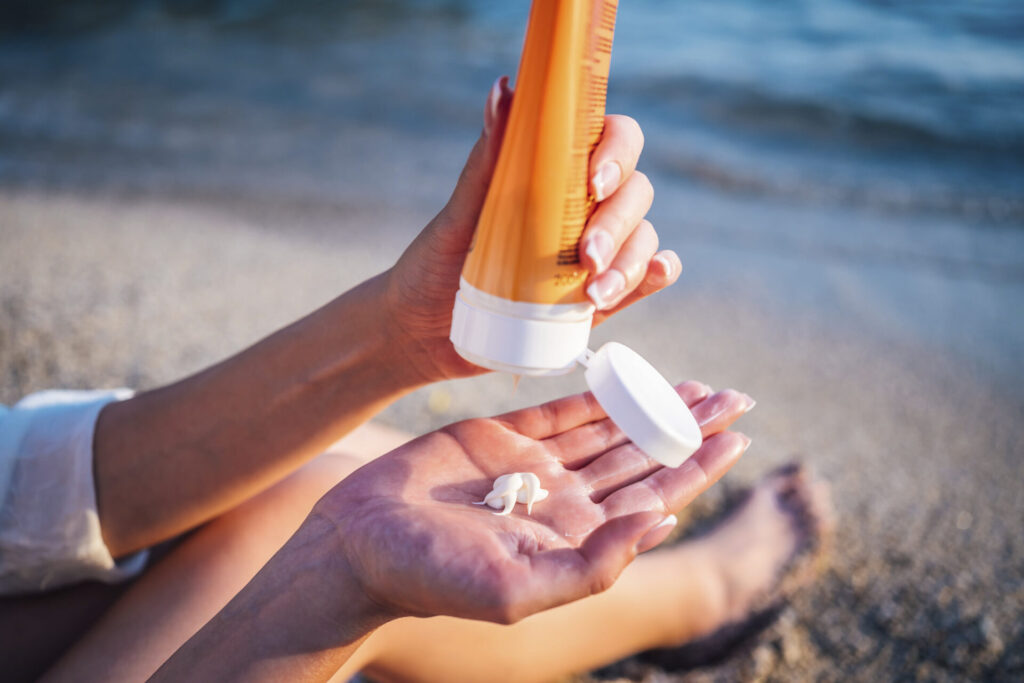You asked, we answered! The Skin Cancer Foundation Photobiology Committee provides evidence-based answers to common questions about sunscreen.
Q: I used sunscreen, and I still got burned. Does that mean my sunscreen doesn’t work?
Steven A. Nelson, MD: There are several reasons you may have sustained sun damage despite applying sunscreen. First, most people do not use enough sunscreen to achieve the SPF level listed on the bottle. Everyone should apply at least two tablespoons (about a shot glass full) of product to the entire body, with a nickel-sized dollop for the face alone. Since studies show that the average person uses one-quarter to one-half the amount needed to reach the SPF listed on the label, an easy method to use when applying sunscreen to ensure adequate protection is the “double coat” method. Just like applying two coats of paint, apply a first layer of sunscreen and rub it into the skin, then immediately follow this with a second application using the same amount of sunscreen.
It’s also crucial to reapply. The ingredients in sunscreen break down over time, and protection can be washed away if you’re swimming or sweating. Reapply every two hours, and immediately after swimming or sweating — even if you’re using a water-resistant product. No sunscreen is waterproof.
Additionally, be sure to check your sunscreen’s expiration date. Sunscreen loses effectiveness over time, so an expired product will not provide the level of protection listed on the label.
Remember, sunscreen is only one part of an effective sun protection routine. You should also cover up with sun-protective clothing, hats and sunglasses, seek shade, and try to avoid direct sun exposure during the peak sunlight hours of 10 AM to 4 PM.
Q: What level of SPF is enough?
Dr. Nelson: Everyone should choose a broad-spectrum sunscreen with an SPF of at least 30 for daily use. If you’re spending extended time outdoors, pick a water-resistant product with an SPF of at least 50. Some people with greater risk factors, like those with a history of skin cancer or certain genetic disorders, may benefit from sunscreens with even higher SPFs.
Q: Are chemical sunscreens safe to use?
Dr. Nelson: All of the products that have earned the Seal of Recommendation contain sunscreen filters that are currently FDA-approved. These ingredients, both organic (chemical) and inorganic (mineral), have been used in the U.S. for many years. Many sunscreens on the market today combine organic and inorganic sunscreen filters.
Some have raised questions about one UV filter, oxybenzone, potentially disrupting hormones. These concerns are mostly based on one study, in which the chemical was fed to rodents and their uterine weight increased. Another study in JAMA Dermatology determined it would take an average-sized woman covering 100 percent of her body every day with the recommended full amount of sunscreen about 35 years to reach that oxybenzone level, and, in fact, would take more than 275 years if she applied sunscreen the way most people do.
That said, if you’re concerned about any chemical ingredient for any reason, there are plenty of sunscreens available that contain only mineral UV filters. You can use The Skin Cancer Foundation’s Sun Protection Product Finder to help you choose a sunscreen that works for you.
Q: Do sunscreens contain benzene?
Dr. Nelson: No, benzene is not normally found in sunscreen. Benzene is a chemical in gasoline and oil, and it is sometimes used in the manufacturing process for synthetic materials like plastic. In recent years, some sunscreens, deodorants and other aerosolized personal care products were recalled due to high benzene levels. These products were likely contaminated during the production process. Benzene is not intentionally added to sunscreen products.
Q: Do sunscreens cause cancer?
Dr. Nelson: No, this claim has no scientific basis. There is no evidence that sunscreen causes cancer, but there is a lot of evidence that ultraviolet (UV) rays from the sun and tanning beds do. UV radiation causes damage to skin cells, which in turn can lead to DNA mutations that cause skin cancer. Sunscreen, as part of a complete sun protection strategy, has convincingly been demonstrated to prevent skin cancer.
ABOUT THE EXPERT
 Steven A. Nelson, MD, is a double board-certified dermatologist and dermatopathologist. He is assistant professor of dermatology at Mayo Clinic College of Medicine and Science and a member of The Skin Cancer Foundation Photobiology Committee.
Steven A. Nelson, MD, is a double board-certified dermatologist and dermatopathologist. He is assistant professor of dermatology at Mayo Clinic College of Medicine and Science and a member of The Skin Cancer Foundation Photobiology Committee.





